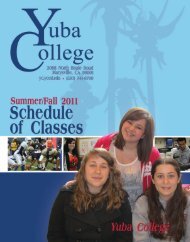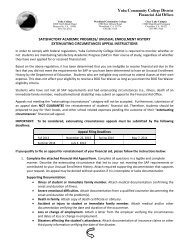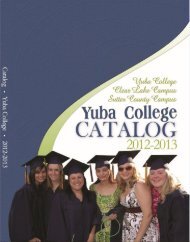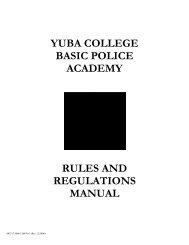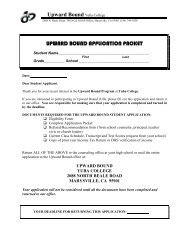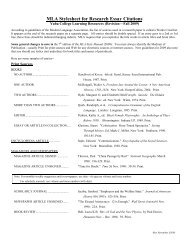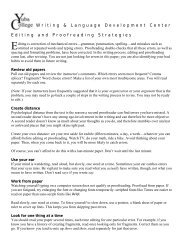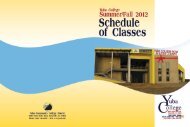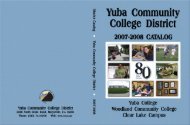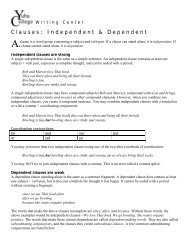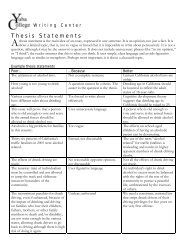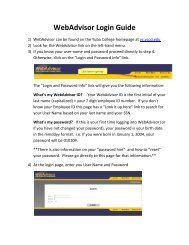yuba college correctional officer core course academy rules and ...
yuba college correctional officer core course academy rules and ...
yuba college correctional officer core course academy rules and ...
Create successful ePaper yourself
Turn your PDF publications into a flip-book with our unique Google optimized e-Paper software.
YUBA COLLEGECORRECTIONALOFFICER CORE COURSEACADEMYRULES ANDREGULATIONSMANUAL005717.00001/56470v1-(Rev 03/2007)
YUBA COLLEGEInter-Department CorrespondenceDate: ____________________TO:C.O.C.C. ACADEMY FACILITATORFROM:_____________________________________SUBJECT:RECEIPT OF RULE AND REGULATIONS, C.O.C.C. ACADEMYI hereby acknowledge receiving a copy of the “C.O.C.C. Academy Rules <strong>and</strong>Regulations.”I underst<strong>and</strong> that as of the date listed above, if I fail to comply with the policies <strong>and</strong>procedures in the “C.O.C.C. Academy Rules <strong>and</strong> Regulations”, I may receivedisciplinary action up to <strong>and</strong> including dismissal from the Academy._________________________________________Student Signature_____________________________Date005717.00001/56470v1-(Rev 03/2007)
ACADEMY RULES AND REGULATIONSTABLE OF CONTENTSMission……………………………………………………………………………….......... 1Code of Ethics…………………………………………………………………………….. 3Honor Code……………………………………………………………………………….. 4Building & Surrounding Area GuidelinesCommunity Rooms………………………………………………………………. 6Academy Offices………………………………………………………………… 8Other Areas………………………………………………………………………. 8Uniform & Grooming St<strong>and</strong>ardsClass A Uniform…………………………………………………………………. 9Class B Uniform…………………………………………………………………. 10Class C Uniform…………………………………………………………………. 10Class D Uniform…………………………………………………………………. 11Grooming…………………………………………………………………………. 13St<strong>and</strong>ards of ConductBreaches of Conduct…………………………………………………………….. 16Military Courtesy…………………………………………………………………. 18Chain of Comm<strong>and</strong>………………………………………………………………. 18Classroom Conduct……………………………………………………………… 19Posting of the Colors/Pledge of Allegiance…………………………………… 21DisciplineDisciplinary Actions……………………………………………………………… 22Appeals……………………………………………………………………........... 24Schedules & DetailsSchedules………………………………………………………………………… 25Meals & Breaks………………………………………………………………….. 26Cadet Assignments……………………………………………………………… 27005717.00001/56470v1-(Rev 03/2007)
ACADEMY RULES AND REGULATIONSTABLE OF CONTENTSClass OfficersPlatoon Leader…………………………………………………………………… 28Platoon Sergeant………………………………………………………………… 28Platoon Corporal………………………………………………………………… 29Platoon Administrative Officer…………………………………………………. 29Attendance & GradingAttendance Requirements……………………………………………………… 31Critical Subjects…………………………………………………………………. 31Grading…………………………………………………………………………… 32Testing & Re-Testing…………………………………………………………… 33Academy Difficulties…………………………………………………………….. 33FirearmsPossession for Training ………………………………………………………… 35Illness & InjuryReporting Procedure……………………………………………………………. 36Modification to Physical Activities…………………………………………… 37MiscellaneousLeaving Early…………………………………………………………………….. 39Message Board………………………………………………………………….. 39Telephones, Pagers, Cell Phones…………………………………………….. 39Transportation…………………………………………………………………… 40Military Obligations……………………………………………………………… 40Subpoenas………………………………………………………………………. 41Graduation………………………………………………………………………. 41005717.00001/56470v1-(Rev 03/2007)
YUBA COLLEGEPUBLIC SAFETY CENTERS.I.B.C. ACADEMYSTUDENT POLICIES AND PROCEDURES MANUALMISSION STATEMENTThe Yuba College Basic “CORE” Academy is dedicated to the education <strong>and</strong> professionalachievement of students planning to enter careers as specialized investigators for state, county,<strong>and</strong> municipal investigation units. The Academy is committed to the philosophy of proactive,problem solving collaborative strategies between law enforcement personnel, CorrectionalOfficers, <strong>and</strong> private citizens as the most effective way to safeguard lives, neighborhoods, <strong>and</strong>communities.The administration, faculty, <strong>and</strong> staff affirm their attention to affect student success inCommunity Oriented Policing through emphasis of: critical thinking, ethical action solving,professional values, individual responsibilities, interpersonal communication, appreciation ofcontributions of other cultures, <strong>and</strong> cooperative civic responsibility.The College is committed to ensuring that these men <strong>and</strong> women are thoroughly prepared toprovide positive partnerships for the improvement of inmate <strong>and</strong> <strong>officer</strong> safety <strong>and</strong> an enhancedquality of life for the diverse communities they intend to serve.OBJECTIVESThe resources devoted to this <strong>academy</strong> are for the purpose of providing students with the highestquality instruction. The <strong>course</strong> content <strong>and</strong> required instructional hours are in accordance withthe st<strong>and</strong>ards <strong>and</strong> m<strong>and</strong>ates set forth by the State Board of Corrections.The successful students who complete this Academy can be assured that they have received thebest available training. This preparation will enable them to perform the required functions oftheir new profession.To receive <strong>college</strong> credit for the C.O.C.C. Academy, students must successfully complete allAcademy requirements. If a student fails to complete any <strong>academy</strong> requirement that results innon-certification, that student will receive an “incomplete” for the CORE Academy Course.However, the student will have to take the entire <strong>course</strong>, within a year or an “F” grade will berecorded on the student’s permanent <strong>college</strong> transcript.ACADEMY RULES AND REGULATIONSThe purpose of this Rules <strong>and</strong> Regulations Manual is to enable you to underst<strong>and</strong> the operatingprocedures of the CORE Academy. All Cadets will comply with the <strong>rules</strong> <strong>and</strong> regulationscontained herein. Any violation of the <strong>rules</strong> <strong>and</strong> regulations may lead to termination from theAcademy. Compliance with Academy <strong>rules</strong> <strong>and</strong> regulations is a requirement of satisfactoryacademic performance, rather than a matter of student discipline, <strong>and</strong> is not subject to the005717.00001/56470v1-(Rev 03/2007)1
<strong>college</strong>’s Student Code of Conduct. Termination from the CORE Academy does not otherwiseaffect a student’s enrollment in the <strong>college</strong>, unless a separate disciplinary action is commencedpursuant to the Student Code of Conduct.You will find that the CORE Academy <strong>and</strong> your Department are quasi-military organizations.Therefore, <strong>rules</strong> <strong>and</strong> regulations established for the efficient operation of the Academy <strong>and</strong> yourDepartment are patterned along military lines.Discipline is learning to do what has to be done in an orderly, planned, <strong>and</strong> team-like manner.Discipline will be emphasized throughout your career, but perhaps never so much as here at theAcademy.005717.00001/56470v1-(Rev 03/2007)2
LAW ENFORCEMENT CODE OF ETHICSAs a law enforcement <strong>officer</strong>, my fundamental duty is to serve mankind; safeguard lives<strong>and</strong> property; to protect the innocent against deception, the weak against oppression orintimidation, <strong>and</strong> the peaceful against violence or disorder; <strong>and</strong> to respect theconstitutional rights of all men to liberty, equality <strong>and</strong> justice.I will keep my private life unsullied as an example to all; maintain courageous calm in theface of danger, scorn, or ridicule; develop self-restraint; <strong>and</strong> be constantly mindful of thewelfare of others. Honest in thought <strong>and</strong> deed in both my personal <strong>and</strong> official life, I willbe exemplary in obeying the laws of the l<strong>and</strong> <strong>and</strong> the regulations of my department.Whatever I see in my official capacity will be kept ever secret unless revelation is necessaryin the performance of my duty.I will never act officiously or permit personal feelings, prejudices, animosities orfriendships to influence my decisions. With no compromise for crime <strong>and</strong> with relentlessprosecution of criminals, I will enforce the law courteously <strong>and</strong> appropriately without fearor favor, malice or ill will, never employing unnecessary force or violence <strong>and</strong> neveraccepting gratuities.I recognize the badge of my office as a symbol of public faith, <strong>and</strong> I accept it as a publictrust to be held so long as I am true to the ethics of the police service. I will constantlystrive to achieve these objectives <strong>and</strong> ideals, dedicating myself before God <strong>and</strong> my chosenprofession. . . . LAW ENFORCEMENT.005717.00001/56470v1-(Rev 03/2007)3
THE HONOR CODEJames O’Keefe said it best in his book, Protecting the Republic, “The police <strong>officer</strong> is theguardian of the American Republic, it st<strong>and</strong>s to reason that the recruitment, selection <strong>and</strong> trainingof the proper person would be of the utmost importance. Clearly, such individuals would have tobelieve in <strong>and</strong> embody the very same virtues of the society they are sworn to protect. Virtuessuch as integrity, respect, character, compassion, <strong>and</strong> genuine respect for justice <strong>and</strong>individual freedoms would all be necessities.”The Honor Code at the Yuba College COCC Academy requires the individual Cadet practice, toa greater degree than ever before, what he or she has already learned at home, in school, or insociety. The Code sets a st<strong>and</strong>ard by which Cadets may judge one another on their capability ofunderst<strong>and</strong>ing <strong>and</strong> maintaining a high degree of honor. Government investigators cannot affordto have in their midst an individual who is untrustworthy. The Code is designed to reveal thosewho cannot measure up to the st<strong>and</strong>ards <strong>and</strong> eliminate the untrustworthy from the group.The following basic points are covered by the Code:1. A Cadet always tells the truth <strong>and</strong> keeps his/her word.2. A Cadet is honest in all his/her efforts; he/she does not lie, cheat or steal nortolerate those who do.3. A Cadet does not quibble, or employ evasive statements <strong>and</strong> tricky wording.4. A Cadet respects the property <strong>and</strong> personal rights of individuals <strong>and</strong> his/herdepartment. He/she is honor-bound to protect that property against abuse or theft,<strong>and</strong> to respect <strong>and</strong> protect the personal rights of others. Any other attitude towardproperty <strong>and</strong> personal rights would be a betrayal of the trust placed in him/her,<strong>and</strong> is contemptible for an investigator.5. A Cadet’s signature <strong>and</strong> their word is his/her bond.6. A Cadet is honor-bound to report any breach of honor that comes to his/herattention. Failure to do so would imply complicity with that dishonorable act <strong>and</strong>would show that he/she is the one that is without honor.These points are defined as, but not limited to the following:1. To be truthful is the ability to conform to fact. To lie is to practice intentionaldeceit, to be untruthful.2. Honesty is the straightforwardness, freedom from deceit or fraud. To cheat is toreceive or give information or in such a manner as to assume an unfair advantageover fellow Cadets, or to present an inaccurate picture of one’s abilities.005717.00001/56470v1-(Rev 03/2007)4
3. In answering a question, accounting for his/her conduct, or explaining adiscrepancy, a Cadet will squarely face the issue. To quibble is to evade the pointin question by making false or misleading statements, by clouding the issue, bysplitting hairs, by the introduction of trifling technicalities, or by the deliberatedisguise of facts so as to present an entirely different picture of the events orissues.4. The Penal Code defines theft as a crime. To engage in theft would disqualify alaw enforcement investigator from holding any position of trust. The success ofinvestigations has depended, in a large part, to teamwork. It is this mutual <strong>and</strong>reciprocal confidence that unites a group of investigators in a common effort. Thepresence of a thief destroys the confidence the members have in one another, <strong>and</strong>ruins the effectiveness of the group.5. When a Cadet places his/her signature or initials on an official document, he orshe certifies to its correctness. They are willing to stake their professionalreputation <strong>and</strong> integrity on the accuracy of that document.6. A Cadet who does not meet the st<strong>and</strong>ards of moral conduct <strong>and</strong> responsibility setby the Honor Code should not be allowed to occupy a position of responsibility<strong>and</strong> trust. Moral weakness, as expressed by a deviation from the principles of theCode, may seem of little importance at the <strong>academy</strong>; a similar deviation, in asituation where lives <strong>and</strong> property are at stake will result in disastrousconsequences.To ensure the continued success of law enforcement as a profession, our investigators must beindividuals of undisputed honesty <strong>and</strong> moral courage. For this reason a Cadet is honor-bound,for the protection of the Code <strong>and</strong> the profession, to report any breach of honor that comes tohis/her attention. The most important element of the implementation of the Honor Code is thenecessity for every man <strong>and</strong> woman in the <strong>academy</strong> to believe in it. It must be respected,honored, <strong>and</strong> followed. Belief in the Code, coupled with an intelligent underst<strong>and</strong>ing of theimportance to the investigator, will engender in the individual the reassuring feeling of beingable to place complete trust in each member of the class.005717.00001/56470v1-(Rev 03/2007)5
I. BUILDINGS AND SURROUNDING AREASA. INTRODUCTIONThis is your Academy. Your cooperation is essential in maintaining the building <strong>and</strong>grounds in excellent condition. Do not write on, mar or deface any buildings orfurnishings. Pick up <strong>and</strong> place in a proper receptacle any waste observed on the grounds.Cadets shall not invite nor allow visitors onto the Academy grounds without priorpermission from the Staff.B. COMMUNITY ROOMSCommunity Rooms are defined as those rooms used by Cadets as a group. Cadets arejointly responsible for keeping these rooms in a clean, neat <strong>and</strong> presentable condition.1. General.a. Place ALL TRASH in the proper receptacles.b. Smoking is not allowed on the <strong>academy</strong> grounds. When smokingoutside of <strong>academy</strong> ground <strong>and</strong> on campus, you will discardcigarettes, cigars, matches <strong>and</strong> other lighted materials in the properreceptacles.c. Do not lean with feet against walls.d. Report any damage or discrepancies of buildings to the AcademyStaff.2. Classrooms.a. Display your name plates on your desks so they are visible to theinstructor during class hours. They shall not be defaced in anymanner. Any alteration/addition to the name tag shall be done byAcademy Staff.b. Classrooms shall be kept neat at all times <strong>and</strong> chairs shall bepushed in when not in use.c. Do not take any food or beverage into the classrooms, only wateris allowed. No gum, c<strong>and</strong>y, toothpicks, etc., will be allowed in theclassroom.d. Do not tamper with any visual aid equipment.e. No Cadet shall enter or remain inside the classroom wearing their<strong>academy</strong> cap unless told to do so by Academy Staff.005717.00001/56470v1-(Rev 03/2007)6
f. Student Tables.(1) Cadet tables shall be neat <strong>and</strong> clean at all times. All books,papers, etc., shall be removed from the tops of their tableduring the breaks. Briefcases, or backpacks, etc., may bekept beside the table but not in such a manner as to notblock the aisle.(2) RTO’s (Recruit Training Officers) may permit Cadets toleave their books, pencils, papers, etc., on top of their tableduring breaks.(3) No part of the uniform shall remain on the desk duringclass hours.(4) No Cadet shall sit on any classroom table.g. Exam Rules.(1) Table tops are to be cleared.(2) Leave room quietly when finished <strong>and</strong> exit the building.(3) Do not re-enter the room.(4) Do not congregate outside the entrance.(5) Remediation exams will be scheduled accordingly.(6) There are times that questions on written examinations stircontroversy. Staff will h<strong>and</strong>le those situations when theyarise.(a)If a Cadet has a question they feel is incorrect, itwill be h<strong>and</strong>led through a memor<strong>and</strong>um.h. Academy Cadets will enter <strong>and</strong> exit the classroom through the doorauthorized by the Academy Facilitator.3. Gymnasium.a. Wear gym shoes that will not leave black marks on the floor.b. Return equipment after use to the proper receptacles.c. Report any damage to equipment to a Staff member.005717.00001/56470v1-(Rev 03/2007)7
d. Cadets may not engage in competitive sports, such as basketball,volleyball, etc., without prior approval from the Physical trainingStaff.4. Defensive Tactics Mat Room & Gymnasium Mat Room.C. ACADEMY OFFICESa. No shoes of any type are to be worn while using the mats.The offices for the Academy Staff are comprised of the Director’s Office, Facilitator’sOffice, <strong>and</strong> Clerical Office.1. Regulations.a. These offices are off-limits to Cadets except to transact officialbusiness.b. Initial contact <strong>and</strong> requests to enter all offices shall be madethrough the chain of comm<strong>and</strong>, unless directed to do otherwise.2. Academy Phone Numbers.D. OTHER AREASa. Academy Director: 634-7771b. Academy Main Office: 634-7723c. Public Safety Secretary: 749-3879d. Office Secretary: 741-69231. Facility Grounds: Any area occupied by Academy Cadets.a. Cigarettes, chew or dip is not allowed in the Academy compoundarea.2. Parking.a. Cadets will park in the east public parking lot of the Yuba <strong>college</strong>campus.005717.00001/56470v1-(Rev 03/2007)8
II.UNIFORM AND GROOMING STANDARDSA. UNIFORMSThe professional Correctional Officer wears a uniform of one type or another throughouthis/her career. How the uniform is worn often plays an important role in the reputation ofthe <strong>officer</strong> <strong>and</strong> agency for which the <strong>officer</strong> works. The Academy environment isestablished to promote the underst<strong>and</strong>ing of these principles <strong>and</strong> to instill a sense of pridein the individual Cadet.1. Cadets shall wear <strong>and</strong> maintain their uniform in an exemplary manner,ensuring that it is cleaned <strong>and</strong> pressed. Shoes shall be shined <strong>and</strong> all metalgoods will be polished. Uniforms shall be examined on a daily basis <strong>and</strong>any excess thread or stains shall be removed.2. No unauthorized items may be placed on any portion of the Academyuniform. Unauthorized items include, but are not limited to, pins, buttons,pagers, stickers, etc.3. Cadets shall not place their h<strong>and</strong>s in their pockets other than to retrieve anitem therein.4. Daily uniform requirements will be listed on the class schedule5. Cadets shall carry their tally cards, during all training hours or whenwearing any Academy uniform.B. CADET DRESS UNIFORM - CLASS “A”1. The C.O.C.C. Class “A” uniform shall be worn for classroom (lecture)instruction <strong>and</strong> any career related field trips.2. C.O.C.C. Cadet Dress Uniform shall consist of the following:a. Affiliated Cadets(1) Department authorized uniformb. Non-Affiliated Cadets(1) White Polo Shirt with the Administration of Justice logo.(2) Khaki or Brown Pants.(3) Socks.(a)White in color.005717.00001/56470v1-(Rev 03/2007)9
(4) Black Shoes or Boots, polished leather, plain rounded toe.(a)Nylon ventilation sides OK.(5) Black Belt.(a)Brass or gold colored buckle or clasp.(6) White T-Shirt authorized.3. When wearing this uniform, it shall be worn in its entirety, <strong>and</strong> shall befree from wrinkles, lint, with shoes <strong>and</strong> brass shined.C. CADET UNIFORM - CLASS “B”1. There is no Class “B” uniform authorized for C.O.C.C. Academy Cadets.D. PHYSICAL TRAINING (PT) UNIFORM - CLASS “C”1. The Physical Training (PT)/Defensive Tactics uniform shall consist of thefollowing:a. Yuba College sweat pants, blue in color.b. Yuba College T-shirt, white in color.(1) On the front of the T-shirt, opposite <strong>and</strong> even with theAdministration of Justice logo, the Cadet’s last name willbe displayed in 1”, UPPERCASE letters.(2) On the back of the T-shirt <strong>and</strong> even with the Administrationof Justice logo, the Cadet’s last name will be displayed in2”, UPPERCASE letters.(3) The letters on both the front <strong>and</strong> back will be navy blue incolor.c. Yuba College shorts, blue in color.d. White athletic socks.e. Running shoes, any color.(1) Good quality to avoid the possibility of “shin-splints”f. Yuba College sweatshirt, blue in color (worn during fall/winteracademies). Lettering to be the same as the T-shirt.2. Physical Training clothing will have the Administration of Justice logo005717.00001/56470v1-(Rev 03/2007)10
affixed.E. RANGE UNIFORM - CLASS “D” – FOR 832 PC1. PT white T-shirt.a. As noted above, the Cadet’s last name will be displayed in 2”UPPERCASE letters on the back side of the shirt.2. Blue jeans, or Black BDU’s pants.3. Tennis shoes or Class “A” footwear.4. Hearing <strong>and</strong> eye protection (provided by the Academy).a. It is recommended that each Cadet provide their own eyeprotection.5. Ballistic vest (provided by the Academy).6. Baseball hat, blue or black in color.7. Duty Belta. Leather or nylon Sam Browne or Sally Browne beltb. Holsterc. Magazine Pouch(1) Must hold a minimum of two magazinesd. Belt Keeperse. H<strong>and</strong>cuff Casef. H<strong>and</strong>cuffs <strong>and</strong> Keyg. H<strong>and</strong>gun(1) Type of fireman authorized.(a)H<strong>and</strong>guns must be double/single action, semiautomaticweapons manufactured by a reputablefirearms manufacturer.[1] Examples of approved makes include,Glock, Smith & Wesson, Beretta, H & K,Sig Sauer, <strong>and</strong> Ruger.005717.00001/56470v1-(Rev 03/2007)11
[2] Other weapon makes may be allowed,however, they must be cleared through therangemaster.(b)H<strong>and</strong>gun calibers must one of the following:[1] 9mm[2] 40 caliber[3] 45 caliber(c)All firearms must be approved <strong>and</strong> inspected by therangemaster.(2) Provider of firearm.(a)Cadets affiliated with an agency are generallysupplied with an agency firearm. If the Cadet’sagency does not provide a firearm, the Cadet may:[1] Supply his/her own firearm, provided itmeets the requirements noted above.[2] Arrange through the Academy Facilitator, atthe time of orientation, the use of an<strong>academy</strong> firearm. Academy firearms issuedto Cadets on range days must be returned tothe rangemaster at the end of each trainingday.(b)Cadets not affiliated with an agency have the optionof :[1] Supplying their own firearm, provided thefirearm meets the requirements noted above.[2] Arranging through the Academy Facilitator,at the time of orientation, the use of an<strong>academy</strong> firearm. Academy firearms issuedto Cadets on range days must be returned tothe rangemaster at the end of each trainingday.005717.00001/56470v1-(Rev 03/2007)12
F. GROOMING STANDARDS1. Requirements.2. Male.a. Cadets affiliated with an agency shall comply with the groomingst<strong>and</strong>ards established by their respective agencies. If no st<strong>and</strong>ardsare in place, then the Academy st<strong>and</strong>ards shall be used. Anyconflicting issues regarding agency vs. <strong>academy</strong> st<strong>and</strong>ards willrequire documentation from the employing/sponsoring agency.b. Cadets shall maintain proper personal hygiene. Dirty fingernails,bad breath, unpleasant body odor, dirty or unkempt hair areprohibited while attending the Academy.c. Cadets shall be neat <strong>and</strong> properly groomed at all times while inattendance at the Academy. The following st<strong>and</strong>ards will be metprior to the first day of training, <strong>and</strong> shall be maintained throughthe final day of graduation.a. Hair Length(1) Hair shall be no longer than three (3) inches in length <strong>and</strong>shall be neatly tapered downward on the back of the neck.Hair shall not touch the shirt collar. (See Annex A)(2) No hair pieces will be worn.b. Sideburns(1) Sideburns shall be neat <strong>and</strong> not excessively thick.Sideburns shall not extend below the middle of the ear <strong>and</strong>shall not exceed one (1) inch in width. (See Annex A)c. Moustaches <strong>and</strong> Other Facial Hair(1) Cadets not having a moustache when the Academy beginswill NOT be allowed to grow one while attending theAcademy.(2) Moustaches must be neatly trimmed <strong>and</strong> not extend downbeyond the corners of the mouth, nor shall the moustacheextend more than ¼ inch horizontally beyond the corners ofthe mouth. (See Annex A)(3) No other facial hair is authorized; this includes beards,goatees, or “five o’clock shadow” fuzz. Cadets will be005717.00001/56470v1-(Rev 03/2007)13
clean shaven.3. Female.a. Hair(1) Hair shall be neatly arranged so that it does not extendbelow the bottom of the collar. Cadets with hair thatnaturally extends down below the collar shall wear it up,off the collar. It must be neat <strong>and</strong> well secured. (SeeAnnex B)(2) No hair pieces shall be worn.(3) No decorations shall be worn in the hair. Hair clips or pinsthat match the color of the hair may be worn.b. Cosmetics(1) Facial make-up shall be kept subdued <strong>and</strong> at a minimum.Light face blush <strong>and</strong> eye shadow is permitted.(2) Fingernails shall not extend beyond the ends of the fingers.Fingernail polish is permitted.(3) False eyelashes are prohibited.c. Brassieres shall be worn at all time during <strong>academy</strong> training <strong>and</strong>will provide adequate support.4. Jewelry.a. Rings(1) A total of two (2) conservative rings may be worn. Forpurposes of this order, a wedding <strong>and</strong> engagement ring willbe considered as one ring.(a)Rings that could cause injury shall be removedduring arrest methods training.005717.00001/56470v1-(Rev 03/2007)14
. Bracelets(1) Medical Alert bracelets are authorized.c. Earrings <strong>and</strong> Piercings(1) Earrings <strong>and</strong> other visible body piercings are prohibited.(a)Earrings <strong>and</strong> other piercings have the potential to behooked by a finger or snagged on clothing during<strong>academy</strong> training.005717.00001/56470v1-(Rev 03/2007)15
III.STANDARDS OF CONDUCTA. REQUIREMENTSCadets shall conduct themselves as ladies <strong>and</strong> gentlemen, perform all duties in a thorough<strong>and</strong> precise manner, <strong>and</strong> carry out all orders, comm<strong>and</strong>s <strong>and</strong> instructions given by Staffpersonnel, without hesitation. Cadets shall not commit any acts during or outside ofscheduled duty hours that are incompatible with the law enforcement profession, orwhich might reflect unfavorably upon the Academy <strong>and</strong> the Cadet’s department. Failureto act in a proper, professional manner whether on or off the Academy grounds couldlead to disciplinary action up to, <strong>and</strong> including, termination.B. BREACH OF CONDUCT AND DEMEANORAny breach of conduct or demeanor is subject to Academy disciplinary action up to, <strong>and</strong>including termination, <strong>and</strong> will become a matter of record in the recruit’s permanent file.Sponsoring agencies will be notified of any breach of conduct or demeanor.1. Prohibited Behavior.a. Stir up discord among trainees, including practicing orencouraging discrimination regarding race, color, sex, religion,national origin or ancestry.b. Display disrespect to a staff member, instructor or fellow Cadet.c. Threaten, attempt or do bodily harm to another.d. Display discourteous treatment of other, including the use ofinsulting, abusive or profane language.e. Display a continuing exhibition of bad taste in the presence ofothers.f. Place the Cadet’s department or the Academy in an embarrassingposition by his/her conduct.g. Cheat during any examination, or knowingly allow another Cadetto cheat.h. Willfully or carelessly destroy or damage Academy property.i. Endanger any person, including him or herself, through careless orwillful violation of safety <strong>rules</strong> or instructions.j. Show willful disobedience of an order, direction or regulation.k. Fail to maintain appropriate personal appearance.005717.00001/56470v1-(Rev 03/2007)16
l. Display negligence in performing official duties, including failureto follow Academy regulations or staff instructions.m. Display willful disregard of the Departmental or Academyregulations.n. Display carelessness, indifference, laziness, lack of alertness, orinattention to duty.o. Drink or have in his/her possession or under his/her control analcoholic beverage on Academy/<strong>college</strong> grounds. Have in his/herpossession or under his control marijuana or non-prescriptionnarcotics on or off the Academy/<strong>college</strong> grounds.p. Be under the influence of drugs <strong>and</strong>/or intoxicants. Cadets will notdrink any alcoholic beverages within 8 hours of any scheduledAcademy training.q. Gamble on Academy grounds.r. Use his/her position for the purpose of personal gain, including theacceptance of gratuities.s. Violate any public law or ordinance (felony or misdemeanor).t. Disclose confidential information without authorization.u. Be absent without leave.v. Willfully falsify any submitted report, record, or request.w. Deliberately falsify a statement in response to any question duringan official inquiry.x. No Cadet shall participate in any sexual harassment activity norknowingly allow any sexual harassment to occur.y. Fail to exhibit proper conduct of his/her personal business or fail topay just debts when due, thereby causing embarrassment to thisAcademy or his/her department.z. Cadet is to report all law enforcement contact to the AcademyFacilitator as soon as possible after the contact.aa.bb.Fail to provide name when asked to do so by Academy Staff or<strong>college</strong> faculty/staff.Be insubordinate to a staff member or class <strong>officer</strong>.005717.00001/56470v1-(Rev 03/2007)17
C. MILITARY COURTESYSince law enforcement agencies are quasi-military organizations, it is appropriate thatthis <strong>academy</strong> adopts military guidelines to facilitate the Cadet’s transition into the lawenforcement <strong>and</strong> corrections profession. These guidelines also ensue that <strong>academy</strong>operation is orderly <strong>and</strong> efficient.1. Regulations.a. Cadets shall at all times display military courtesy toward the<strong>academy</strong> staff, superior <strong>officer</strong>s, <strong>and</strong> official guests.b. Cadets shall st<strong>and</strong> at attention when addressing or being addressedby a superior <strong>officer</strong> <strong>and</strong> at other times when so ordered.c. Cadets shall follow the appropriate chain of comm<strong>and</strong> whenaddressing Staff regarding information that affects other Cadets(see Chain of Comm<strong>and</strong> listed below).d. Cadets will follow orders given by the platoon leader or by his/hernext chain of comm<strong>and</strong>.e. Violations of the chain of comm<strong>and</strong> can result in disciplinaryaction.D. CHAIN OF COMMAND1. The chain of comm<strong>and</strong> for the Academy is as follows:a. Chancellor, Yuba Community College District.b. President, Yuba College.c. Director, Public Safety Center.d. Facilitator, C.O.C.C. Academy.e. Recruit Training Officer (RTO), C.O.C.C. Academy.f. Platoon Leader/or Squad Leader.g. Platoon Sergeant.h. Platoon Corporal.i. Platoon Administration Officer.j. Student/Cadet.005717.00001/56470v1-(Rev 03/2007)18
2. The chain of comm<strong>and</strong> shall be adhered to at all times. Cadets wishing tospeak to the <strong>academy</strong> staff shall follow the chain of comm<strong>and</strong> prior tocontacting any staff member, unless otherwise ordered to report to saidstaff member.a. If a Cadet believes a question has not been settled after talking to amember of the <strong>academy</strong> staff, the Cadet may request to continueup the chain of comm<strong>and</strong> to the Director of Public Safety.(1) The request shall be put in writing showing good causewhy the Cadet wishes to proceed up to the Director ofPublic Safety.3. Formations <strong>and</strong> Marching.a. Cadets will be required to march in formation during variousactivities when directed by staff. Cadets will also be required tomarch (or double-time) in formation under any of the followingcircumstances:(1) When en route to or from designated assembly points or fortraining.(2) When ordered to do so by a staff member.b. Cadets will not talk amongst themselves when marching in platoonformation.c. Cadets will not wear glasses with colored lenses while information.E. CLASSROOM CONDUCT(1) Exceptions to be made on a case by case basis.A large portion of the Cadet training is completed in the classroom. It is necessary thatall Cadets adhere to the following regulations, which will promote an orderlyenvironment conducive to learning volumes of information.1. Regulations.a. Cadets shall not engage or participate in any behavior that isdisruptive to the instructor or classroom learning environment.b. Cadets shall be alert, attentive, <strong>and</strong> shall sit up straight with bothfeet flat on the floor.c. Only those items related to training are allowed on the desk tops.005717.00001/56470v1-(Rev 03/2007)19
d. Staff instructors desire <strong>and</strong> encourage questions, provided that theyrepresent an honest attempt to gain information.e. Cadets should have a sincere interest, an open mind, <strong>and</strong> a desire tolearn. No questions should be asked which are not pertinent to thesubject being discussed, or which are presented to show off or killtime.f. When questions are posed, the Cadet shall gain the instructor’sattention by raising his/her h<strong>and</strong>. Once recognition is gained, theCadet shall preface the question with, “Sir,” “Ma’am,” “Ms.” Orrank, whichever is appropriate. This is not only a matter ofcourtesy, but it affords other Cadets the opportunity to hear thequestions.g. No Cadet will sleep while a class is in session. Any Cadet whofeels too fatigued to remain awake will st<strong>and</strong> up quietly go to theback of the classroom where they will st<strong>and</strong> until they becomesufficiently awakened to return to their seat.(1) It will be the responsibility of each Cadet to keep his/herneighbor Cadet awake during classroom hours.h. Cadets will ensure that audible watches, or other type of alarms,are silenced in the classroom.i. No electronic devices of any kind will be allowed in the classroomduring examinations without prior approval of the AcademyDirector.j. Pagers <strong>and</strong> cellular phones must be set to “vibrate” or turned offwhile on <strong>academy</strong> grounds, in the classroom, gym, range, or othertraining site areas.k. No tape recorders are allowed in the classroom unless permitted bythe instructor.l. No Cadet will leave the classroom, during <strong>academy</strong> hours, withoutpermission of the platoon leader.m. No Cadet will leave <strong>academy</strong> grounds, during <strong>academy</strong> hours(other than scheduled lunch), without first reporting to either theRTO on duty, Facilitator, or Director using proper chain ofcomm<strong>and</strong>. Once the Cadet has notified the proper staff member<strong>and</strong> permission has been given by that staff member, the Cadet isfree to leave <strong>academy</strong> grounds.(1) Prior to leaving <strong>academy</strong> grounds, the Cadet will also write005717.00001/56470v1-(Rev 03/2007)20
a memo explaining the reason for leaving <strong>and</strong> deposit thememo as instructed by Academy Staff.n. Any disruptive behavior by a Cadet in the classroom will result indisciplinary action.F. POSTING OF THE COLORS/ PLEDGE OF ALLEGIANCEAt the <strong>academy</strong>, the start <strong>and</strong> end of each class day involves the raising <strong>and</strong> lowering ofthe American Flag. C.O.C.C. Cadets may participate in this opening ceremony, as wellas reciting the “Pledge of Allegiance.” Participation in either ceremony is voluntary.Cadets not wishing to participate in the ceremony are still required to be at the <strong>academy</strong>at the designated times <strong>and</strong> are to remain in the <strong>academy</strong> classroom during the ceremony.005717.00001/56470v1-(Rev 03/2007)21
IV.DISCIPLINEA. REQUIREMENTSThe Cadet will, at all times during <strong>academy</strong> training, follow all <strong>rules</strong> <strong>and</strong> regulations asset forth in this manual both on <strong>and</strong> off <strong>academy</strong> grounds.B. DISCIPLINARY ACTIONSWhile the C.O.C.C. Academy recognizes the concept of progressive discipline, nothingcontained herein shall be construed to mean that the Academy administration may not,depending on the severity of the student infraction, proceed directly to a recommendationof termination without first administering a verbal reprim<strong>and</strong>, written notice ofunsatisfactory performance, suspension, or Director’s probation.1. Any failure to comply with the <strong>rules</strong> <strong>and</strong> regulations may result in one ormore of the following actions, depending on severity:a. Tally Cards are a means of recording policy infractions committedby Cadets. For this reason, Tally Cards must be carried by theCadet or be in the Cadet’s immediate proximity so entries can bemade by Academy Staff.(1) The loss or non-availability of a Tally Card will result inthe Cadet writing a Corrective Memo on the subjectdecided by the Academy Staff.(2) Correction Memos assigned to Cadets will be prepared <strong>and</strong>turned in the following class day at the start of class.(3) No memo or outside assignment will be completed duringclassroom hours unless directed by Academy Staff.(4) The completed Correction Memo will be placed in theCadet’s training file.b. Verbal (oral) Reprim<strong>and</strong>.c. Notice of Unsatisfactory Performance (Written Reprim<strong>and</strong>).(1) When a Cadet receives a Notice of UnsatisfactoryPerformance as a result of a disciplinary issue, the Cadetwill have two (2) days in which to write a rebuttal to thenotice.(2) The completed rebuttal will be attached to the original005717.00001/56470v1-(Rev 03/2007)22
notice <strong>and</strong> placed in the Cadet’s training file.(3) Agencies sponsoring a Cadet shall be notified <strong>and</strong> briefedregarding a Cadet’s Notice of Unsatisfactory Performance.d. Suspension (maximum of two days)(1) Agencies sponsoring a Cadet shall be notified <strong>and</strong> briefedregarding a Cadet’s suspension.e. Director’s Probation (minimum of 100 calendar days)(1) Agencies sponsoring a Cadet shall be notified <strong>and</strong> briefedregarding a Cadet’s probation status.f. Termination from Academy(1) Agencies sponsoring a Cadet shall be notified <strong>and</strong> briefedregarding a Cadet’s termination from the Academy.2. The type of disciplinary action will be determined by the Academy Staff<strong>officer</strong> who witnessed the action <strong>and</strong> the Cadet’s RTO. In matters of amore serious nature, the disciplinary action will be determined by theFacilitator <strong>and</strong>/or the Academy Director.3. The Cadet’s disciplinary history will be documented by the Cadet’s RTOor Facilitator. Cadets will be made aware of any disciplinary actions, <strong>and</strong>the Cadet’s RTO will work with the Cadet to remedy any problems.Cadets are encouraged to periodically read their <strong>academy</strong> file with theirRTO to review their progress in all aspects of training.4. Cadets will be aware of the following limits in regards to rule infractions:a. Tally Cards will be carried at all times by the Cadet or be in theCadets immediate proximity while attending <strong>academy</strong> activities.b. Cadets will only be allowed one (1) Notice of UnsatisfactoryPerformance (disciplinary). A second disciplinary incident thatresults in a Notice of Unsatisfactory Performance will result intermination from the <strong>academy</strong>.(1) This does not apply to notices which are the result ofanother academic failure, report writing failure, firearmsfailure, DTAC failure, or scenario failure (see thosespecific areas for number of failures allowed beforetermination).005717.00001/56470v1-(Rev 03/2007)23
C. APPEALc. Entries on a Tally Card may not always precede the Notice ofUnsatisfactory Performance. Violations of a more serious naturewill be initially documented on the Notice of UnsatisfactoryPerformance.1. If the C.O.C.C. Cadet is recommended for termination from the <strong>academy</strong>by the Facilitator, the Cadet has the right to appeal. The first, <strong>and</strong> last,level of appeal is the Director of Public Safety. The Cadet appealing thetermination <strong>and</strong> remaining in attendance will not receive any class creditnor earn any certificates for any material covered during the process if theappeal is unsuccessful.a. The Cadet must file a written appeal within two (2) business days.However, the Cadet cannot attend <strong>academy</strong> classes until the appealis filed. Any time missed while filing an appeal will go against theCadet’s overall missed <strong>academy</strong> time.2. Once the appeal is filed, an administrative hearing with the Director ofPublic Safety will be scheduled. If this appeal process requires more thanone day to resolve, the Cadet will do the following:a. Attend scheduled training in street clothes if the training dayrequires the Class A uniform.b. Attend scheduled training in the uniform of the day (i.e., DTAC &Range) if other than Class A.3. Dismissal/termination from the <strong>academy</strong> does not prohibit thestudent/Cadet from attending other semester <strong>course</strong>s at this <strong>college</strong>campus.005717.00001/56470v1-(Rev 03/2007)24
V. SCHEDULES AND DETAILSA. GENERALPromptness is a requirement for all schedules <strong>and</strong> details. The C.O.C.C. Academy usesmilitary time (the 24-hour clock) <strong>and</strong> all schedules are listed by this time. Schedules willbe posted on the class message board, <strong>and</strong> are subject to frequent change. In addition toscheduled classes, Cadets will be given assignments to assist in the daily operation of theAcademy. Each Cadet must endeavor to give his or her best effort when assigned adetail.B. SCHEDULES1. Regulations.a. Each Cadet will observe <strong>and</strong> make note of the dates <strong>and</strong> times ofall classes, meetings, <strong>and</strong> other required events, as well as anysubsequent changes.b. Cadets will be prompt to all scheduled events.c. All Cadets shall familiarize themselves with the schedule in orderto bring the related texts, references, <strong>and</strong>/or equipment to class <strong>and</strong>to present themselves in the proper uniform, in the properclassroom or training area, at the proper time.d. Cadets shall check the message board each day for schedulechanges <strong>and</strong> message.e. Cadets shall arrive <strong>and</strong> be prepared to begin each period ofclassroom instruction at the scheduled class time.f. Cadets will submit a memor<strong>and</strong>um explaining the reason for anyabsence from training. The memor<strong>and</strong>um will be completed <strong>and</strong>turned into the Academy Facilitator no later than the beginning ofthe next scheduled training day.(1) If the Cadet knows in advance that he/she will be missingtraining, a memor<strong>and</strong>um requesting leave for the missedtraining <strong>and</strong> why the Cadet will be missing training will beturned into the Facilitator prior to the missed training.(a)The memo cannot say for “personal reasons.”Cadets must identify the reason.(2) If the missed training is in an area in which hours cannot be005717.00001/56470v1-(Rev 03/2007)25
missed (i.e., firearms, defensive tactics), the Cadet mustmake arrangements to make those hours up.(a)See Section VII, B (Critical Subjects) for furtherexplanation.g. Affiliated Cadets must not only notify the <strong>academy</strong> regardingmissed training, they must also notify the contact <strong>officer</strong> of theirrespective agency.C. MEALS AND BREAKSC.O.C.C. Cadets shall be given adequate time to eat at least one meal per day.Additionally, Cadets will be given periodic breaks during classroom instruction.Scheduled meals are subject to change during any training day.1. Meal Breaks.a. Cadets may use this time <strong>and</strong> the facilities available inconformance with the general <strong>rules</strong> of the Academy.b. During meal breaks Cadets will usually be permitted to leave theAcademy grounds.(1) If the Cadet chooses to leave the grounds during a mealbreak, they will do one of the following:(a)(b)Remove their <strong>academy</strong> hat <strong>and</strong> remove/cover theiruniform shirt (if wearing a Class “A”) with anothershirt or jacket; orRemove their <strong>academy</strong> hat <strong>and</strong> shirt until theyreturn to the Academy grounds.[1] Covering or removing the uniform hat <strong>and</strong>shirt shall apply any time the Cadet is not onthe <strong>college</strong> campus unless otherwise orderedto do so by Academy Staff.005717.00001/56470v1-(Rev 03/2007)26
c. Cadets will not use their department or <strong>academy</strong> position for thepurposes of obtaining a discount for food or any otherfavors/services2. Classroom Breaks.a. Cadets shall not leave <strong>academy</strong> grounds during classroom breakswithout permission from Staff.b. Cadets shall not go to the parking areas without permission fromStaff.c. Cadets will not be allowed visitors without permission fromAcademy Staff.D. CADET ASSIGNMENTSCadet assignments will be appointed to individuals <strong>and</strong> groups. The assignments aremade by Staff <strong>and</strong> are designed to accomplish specific tasks as well as to expose theCadet to the h<strong>and</strong>ling of responsibility within the framework of the <strong>academy</strong>.1. Cadets will be expected to fulfill the requirements of their assignments tothe best of their abilities.2. Cadets shall obey orders issued by appointed Cadet leaders.3. After compliance with orders, the Cadet may contact a staff <strong>officer</strong> if theCadet has reason to believe that the orders were not appropriate orjustified.005717.00001/56470v1-(Rev 03/2007)27
VI.CADET CLASS OFFICERSA. PLATOON LEADER1. The purpose of the platoon leader is to assist the <strong>academy</strong> staff <strong>and</strong> givethe <strong>academy</strong> staff an opportunity to better evaluate the individual Cadet’sleadership potential. The platoon leader shall be appointed by <strong>academy</strong>staff.a. Duties of the platoon leader.(1) Assist the instructors <strong>and</strong> <strong>academy</strong> staff as required.(2) Ensure the class is in conformity with conduct <strong>and</strong>behavioral st<strong>and</strong>ards at all times.(3) Maintain a current roster of home phone numbers,addresses <strong>and</strong> department affiliation of all members of theclass for emergency purposes.(4) Ensure the class is assembled for instruction at the correcttimes <strong>and</strong> locations.(5) Form the class for inspections.(a) Accompany inspecting law enforcementdignitaries/<strong>academy</strong> staff during inspections.(b)Record all infractions noted by the inspecting lawenforcement dignitary or <strong>academy</strong> staff.B. PLATOON SERGEANT(6) Assemble <strong>and</strong> prepare the class for <strong>academy</strong> staff whenordered to do so.(7) Assign Cadets to various details <strong>and</strong> tasks when directed todo so by <strong>academy</strong> staff, or as necessary.(8) Move the class in a military manner, in formation, asrequired.(9) Ensure all absences <strong>and</strong> Cadets late for class have beendocumented <strong>and</strong> reported to staff.1. The duties of the platoon sergeant are to assist the platoon leader <strong>and</strong> the<strong>academy</strong> staff with the class to give the <strong>academy</strong> staff an opportunity to005717.00001/56470v1-(Rev 03/2007)28
etter evaluate the individual Cadet’s leadership potential. The platoonsergeant is not a link in the chain of comm<strong>and</strong> unless the platoon sergeantis acting as platoon leader in absence of the assigned platoon leader.a. Duties of the platoon sergeant.C. PLATOON CORPORAL(1) Be prepared to take charge of the class in the absence of theplatoon leader.(2) Assist the platoon leader, <strong>academy</strong> staff <strong>and</strong> instructors asrequired.(3) Carry the flag in formation.(4) Assist platoon leader in marching drills.(5) Insure daily attendance is recorded.(6) Insure all absences <strong>and</strong> Cadets late for class have beendocumented <strong>and</strong> reported to the Academy Staff at thedirection of the platoon leader.(7) Be prepared to h<strong>and</strong>le any additional assignments given by<strong>academy</strong> staff or platoon leader1. Platoon Corporals shall be appointed by the Academy Staff to giveFacilitator/RTO’s the opportunity to better evaluate the individual recruit’sleadership potentiala. Duties of the Platoon Corporal(1) Work with the Administrative Officer <strong>and</strong> assign primaryField Training Officers (FTOs) to all non-affiliated Cadets,<strong>and</strong> monitor the performance of FTOs <strong>and</strong> students(2) Reassign non-affiliated Cadets to a secondary FTO after thefirst third (1/3) of the <strong>academy</strong>, <strong>and</strong> monitor theirperformance(3) Reassign non-affiliated Cadets back to their primary FTOduring the last third of the <strong>academy</strong> <strong>and</strong> monitor theirperformanceD. PLATOON ADMINISTRATIVE OFFICER1. The Platoon Administrative Officer shall be prepared to take over thesquad in the absence of the Platoon Corporal005717.00001/56470v1-(Rev 03/2007)29
a. Duties of the Platoon Administrative Officer(1) Work with all non-affiliated Cadets <strong>and</strong> ensure they arereceiving adequate training from FTOs.(2) Work with Platoon Corporal on all FTO assignments(3) Complete any paperwork required by Academy Staff(4) Assist instructors with any board work or documentations,or writings.005717.00001/56470v1-(Rev 03/2007)30
VII.ATTENDANCE/GRADINGA. ATTENDANCE1. The following <strong>rules</strong> apply for class attendance. The hours are m<strong>and</strong>atedby STC. Cadets not attaining the following attendance st<strong>and</strong>ards will notreceive a certificate for the C.O.C.C. Academy.a. 100% for the entire Academy. The Academy only consists of 22days. Any missed time must be excused <strong>and</strong> made up throughremediation. Missing more than one (1) day will result in dismissal.B. CRITICAL SUBJECTS1. Missed hours in critical categories (i.e., Defensive Tactics) must be madeup in order to successfully complete the <strong>academy</strong>.2. Cadets are required to make up missed training hours. However, they willonly be allowed to make up their missed hours if the absence (missedtraining) is one that is “allowable/excused.”If the missed training is not considered to be an allowable/excusedabsence, the Cadet will not be allowed to make up missed training hours<strong>and</strong> may be dismissed/terminated from the <strong>academy</strong> at that time.a. Listed below are absences considered allowable/excused.However, circumstances not listed below will be decided on a caseby case basis by Academy Staff.(1) Injured, unable to participate.(2) Family emergency (death in family, family member ill).(3) Cadet sick, unable to attend class.b. Listed below are examples of absences not allowed/excused formakeup time. Cadets are encouraged to schedule such eventsduring non-<strong>academy</strong> hours.(1) Any stage of testing for agencies.(2) Personal time.(3) Medical appointments.(a)Except those incurred on site <strong>and</strong> in need ofimmediate treatment.005717.00001/56470v1-(Rev 03/2007)31
As stated in “a.” above, other circumstances will be decided on a case bycase basis by Academy Staff.3. Academy staff will make every effort to locate the same training that wasmissed by the Cadet in one of the other law enforcement academiesoffered at this campus (i.e., Cadet misses day three of DTAC, day three ofDTAC will have to be made up).The Cadet should underst<strong>and</strong> that finding scheduled training presentingthe same information they missed will be very difficult <strong>and</strong>, at times, beimpossible.4. If the same training as missed by the Cadet is located, the Cadet will beallowed to attend that training to make up the missed training.a. Because making up this training might incur overtime for Cadetsaffiliated with a government agency, this training issue will bereported to the Cadet’s sponsoring agency.5. If the same training cannot be found, the Cadet will be allowed to continueattending the <strong>academy</strong>. However, because not all training hours will havebeen met as required by STC, the Cadet will not graduate with the class.The Cadet will have to make up missed training no later than the nextscheduled C.O.C.C. Academy (i.e., hours missed in C.O.C.C. AcademySpring 2007 would have to be made up in C.O.C.C. Academy Fall 2007).C. GRADINGOnce missed hours have been made up by the Cadet, the Cadet will thenreceive his/her C.O.C.C. Academy Certificate through Yuba College.If the Cadet does not make up the missed training hours in the nextscheduled <strong>academy</strong>, the Cadet will have to complete another <strong>academy</strong>,beginning from day one, in order to earn their C.O.C.C. AcademyCertificate.1. The following guidelines are set for the named areas.a. Overall academic average needed: 70%.b. Job Knowledge Test (JKTs): 70%.(1) You will be expected to complete a minimum of 4 JKTsduring the <strong>academy</strong>. JKTs are classified as multiple choice<strong>and</strong>/or true-false questions.c. Written Skills Test (WSTs): Pass/Fail005717.00001/56470v1-(Rev 03/2007)32
(1) You will be expected to complete a minimum of 10 WSTsduring the Academy. WSTs are classified as short answers,essays, or completing documents.d. Behavioral Skills Tests (BSTs): Pass/Fail(1) You will be expected to complete a minimum of 38 BSTsduring the <strong>academy</strong>. BSTs are classified as verbal <strong>and</strong>physical demonstrationD. TESTING & RE-TESTING (Remediations)1. There will be situations in which a Cadet will miss an examination. ACadet taking a make-up exam will not discuss the exam with Cadets whohave already taken the exam. This is considered cheating <strong>and</strong> is groundsfor termination from the C.O.C.C. Academy2. When a Cadet fails a STC or Academy constructed examination, he/shewill be allowed to re-take (or “remediate) a similar exam.a. Make up or remedial examinations will be given at a timedesignated by Academy Staff.b. A total of two (2) successful remediations will be allowedc. A third failure of a STC or Academy constructed examinationwill result in termination from the C.O.C.C. Academy.3. To assist the Cadet in passing the remediation examination, remediationinstruction <strong>and</strong> remediation assignments will be offered. It will be theCadet’s choice whether to accept this learning assignments4. Any failure of a STC constructed remediation examination orAcademy constructed remediation examination will result intermination from the <strong>academy</strong>.E. ACADEMIC DIFFICULTIES1. C.O.C.C. Cadets experiencing academic difficulties are encouraged toseek guidance. Cadets requiring additional assistance or an appointmentwith an instructor shall make the necessary arrangements through thechain of comm<strong>and</strong>. If the Cadet’s RTO is not available, then Cadets maymake appointments with other Academy Staff (Facilitator).2. Cadets having difficulty of any kind which may have a detrimental effecton their <strong>academy</strong> performance are encouraged to see their RTO.005717.00001/56470v1-(Rev 03/2007)33
a. RTOs are experienced <strong>officer</strong>s. They are available for assistance,guidance <strong>and</strong> advice.b. Problems of a personal nature will be h<strong>and</strong>led in a confidentialmanner.c. It is highly recommended that those with academic difficulties joina study group.F. PERSONAL QUALIFICATIONSIn addition to academic <strong>and</strong> skills performance, Cadets will be evaluated on personalqualifications which include, but are not limited to:1. Initiative <strong>and</strong> motivation.2. Interacting with others.3. Overall knowledge.4. Maturity.5. Classroom participation.6. Report Writing.005717.00001/56470v1-(Rev 03/2007)34
VIII. FIREARMS ON CAMPUS – PC 832 TRAINING PORTION*The following policy applies to the C.O.C.C. Cadet’s training firearm while engage in thePC 832 portion of the <strong>course</strong>. Firearms other than the Cadet’s training firearm are NOTAUTHORIZED by the <strong>academy</strong>. Bringing any firearm on the <strong>college</strong> campus withoutAcademy authorization is a felony per PC 626.9.A. POSSESSION FOR C.O.C.C. ACADEMY TRAININGAll firearms are to be h<strong>and</strong>led in a safe manner. Each Cadet will follow all firearmssafety <strong>rules</strong> <strong>and</strong> regulations.1. Cadets shall bring firearms to training only when instructed to do so byAcademy Staff. Firearms will only be used at the range, so there is noreason to bring a firearm to the <strong>college</strong> campus unless directed to do so bystaff.2. When carrying a firearm at the range, it will be unloaded until instructedby the Rangemaster to do otherwise. The magazines too will be unloadedas well.3. While at the training facility, the firearm will remain in its holster. It willnot be removed by the Cadet unless ordered to do so by <strong>academy</strong> staff(i.e., weapons inspection).4. When the Cadet is traveling to <strong>and</strong> from the range, the firearm will NOTbe worn on their person. The firearm will be transported unloaded in thetrunk or an appropriately locked box if carried in the passengercompartment of their vehicle.a. When the Cadet is traveling to <strong>and</strong> from the range, for anypurpose, the Cadet will not wear his/her duty gear (Sam Brownebelt). The belt (duty gear) will not be worn until the Cadet arrivesat the training facility.005717.00001/56470v1-(Rev 03/2007)35
IX.ILLNESS AND INJURYA. DEFINITIONS1. An “On-Duty” injury is an injury incurred during scheduled training orinstruction. Generally, it is classified as compensatory injury in which thesponsoring agency pays the medical expenses.2. An “Off-Duty” injury is an injury incurred during leisure or liberty hours.Expenses are the responsibility of the Cadet.B. REPORTING PROCEDURE1. On-Duty Injury.a. Cadets shall report any illness or injury which occurs duringtraining to the instructor immediately. Follow-up notification shallbe made to Academy Staff as soon as possible.2. Off-Duty Injury.a. Injuries which occur off-duty will be reported to staff as soon aspractical, but no later than 0800 hrs. on the day the Cadetreturns/reports to the <strong>academy</strong>.b. If an off-duty injury or illness is serious enough to prevent theCadet from returning to the Academy as scheduled, the Cadet shallnotify Academy Staff. A message left on an Academy answeringmachine will be considered proper notification.3. In addition to the above, the Cadet will complete a memor<strong>and</strong>um,addressed to the RTO explaining the absence. This will be completed nolater than 0800 hrs. the following training day of the reported absence orCadet’s return to the <strong>academy</strong>.4. Limited first aid equipment is available in the Staff Office. When at anoff-site training facility, Cadets must ask an instructor for first aidequipment.5. Cadets with major illnesses or injuries will be treated at local medicalcenters <strong>and</strong> hospitals.6. Compensation of medical expenses is subject to review <strong>and</strong> approval ofthe <strong>college</strong>. However, the normal <strong>course</strong> of action is for the Cadet’sinsurance to be the primary with the <strong>college</strong> being the secondary.005717.00001/56470v1-(Rev 03/2007)36
7. With the exception of serious illness or injury, Cadets should make everyeffort to be present during all <strong>academy</strong> instruction. In order to satisfyState m<strong>and</strong>ates, many classes require personal attendance <strong>and</strong> cannot bemade-up. Cadets will be notified when these classes are going to occur.Due to the nature of the m<strong>and</strong>ates, Cadets who miss any one of theseclasses will not be allowed to graduate.8. Cadet attendance will be tracked on an hourly basis. Due to the nature ofthe training, any Cadet who misses more than 5 percent of instruction willnot be allowed to continue the <strong>academy</strong>, regardless of the nature of theabsence.C. MODIFICATION TO PHYSICAL ACTIVITIES DUE TOILLNESS/INJURY1. From time to time Cadets receive injuries that prevent them fromparticipating in full physical activities. These issues are addressed asfollows:a. If the Cadet has a minor injury that would prevent the Cadet fromparticipating in strenuous physical activity during physical training(P.T.), or Defensive Tactics, notification should be made to theinstructor. The instructor will make the decision on whether toallow the Cadet to be assigned to an alternate activity.(1) Alternate physical activities allow the Cadet to receive fullattendance for the assigned P.T. or Defensive Tactics time.(2) P.T.(a) Cadets will be allowed a maximum of three (3)alternate physical training days throughout the<strong>academy</strong>.(b)(c)If a Cadet has an injury in which two (2) or moreconsecutive alternate physical training days areneeded, then a note from a physician is requiredIf a Cadet has an injury that will not allow for analternate activity, then a physician’snote/statement/form is required.(3) Defensive Tactics(a) Cadets will be allowed a maximum of one (1)alternate activity throughout the <strong>academy</strong>.(b)Any additional requests for an alternate activity will005717.00001/56470v1-(Rev 03/2007)37
equire a physician’s note/statement/form.(c)If a Cadet has an injury that will not allow for analternate activity, then a physician’snote/statement/form is required.005717.00001/56470v1-(Rev 03/2007)38
X. MISCELLANEOUSA. LEAVING EARLY, LATE OR ABSENT BECAUSE OF NON-ILLNESS1. When a Cadet leaves the Academy early, arrives late or has a non-illnessrelated absence, the Cadet will write a memo explaining the reason.a. If a Cadet knows they are going to be leaving early, the memo willbe written prior to leaving.b. If a Cadet knows he/she is going to miss training regarding a nonillnesssituation (i.e., oral board/agency testing, doctor’sappointment), the memo will be completed prior to the absence.(1) The above listed memos will be written on a general memoform (white), not a corrective memo form (blue).2. When arriving late or leaving early, the Cadet will report to AcademyStaff before going to the classroom or leaving <strong>academy</strong> grounds.B. MESSAGE BOARD1. Cadets shall read <strong>and</strong> comply with all schedules, instructions, orders <strong>and</strong>official notices posted on the Academy message board. Cadets will checkthe board during their breaks.2. The message board is for staff use only.3. Cadets shall not alter, remove, or deface a posted notice.C. TELEPHONES, PAGERS AND CELL PHONES1. Audible pagers <strong>and</strong> cell phones are not allowed on the Cadet’s person.All such devices shall be set to “silent” or “vibrate” <strong>and</strong> stowed away in abackpack or carrying bag.a. Cell phones may be used during breaks, but shall be used in adesignated area that does not disturb other Academy classes.(1) Exceptions will be decided on a case by case basis by staff.2. Cadets will not use the <strong>college</strong> phones except on official business <strong>and</strong> thenonly when specifically authorized by a staff member.3. Incoming personal calls shall be restricted to emergency calls only.Emergency calls accepted by staff will be limited to those from immediatefamily members or agency supervisors only.005717.00001/56470v1-(Rev 03/2007)39
4. Cadets shall not enter any administrative office to answer a telephoneunless directed to do so by staff.5. Cadets shall not call either staff or clerical personnel to obtain test s<strong>core</strong>s.6. Cadets will be allowed to use the pay phone located to the front ofBuilding 1700. This telephone will be used only during authorized breaks.Any use of the telephone other than on breaks will need to be authorizedby staff.D. TRANSPORTATION1. Any personal vehicle must comply with all of the provisions of theCalifornia Vehicle Code.2. Personal vehicles shall be driven in a lawful manner at all times both on<strong>and</strong> off campus.3. Cadets driving personal vehicles to the <strong>academy</strong> shall park them only inauthorized areas. Academy property will not be left unattended insidepersonal vehicles.4. Cadets driving to a campus must have a current driver’s license or withinthe parameters of a DMV “suspended license.”E. MILITARY OBLIGATIONS1. Procedure.a. C.O.C.C. Cadets with military obligations which would in any wayconflict with training requirement shall submit details bymemor<strong>and</strong>um to the RTO or Facilitator during the first trainingday. Details should include:(1) The Cadet’s full name, military rank <strong>and</strong> serial number.(2) Dates <strong>and</strong> locations of the training maneuvers that are inconflict. (Copy of the orders shall be made available uponrequest.)(3) Annual two-week active duty periods or any other activeduty time must be scheduled so as not to interfere withAcademy training due to state-m<strong>and</strong>ated classes.(4) Classes missed due to military leave will be h<strong>and</strong>led on acase by case basis by the Academy Director.005717.00001/56470v1-(Rev 03/2007)40
F. SUBPOENASA Cadet who receives a subpoena for a court appearance must notify <strong>academy</strong> staff inwriting as soon as possible. A copy of the subpoena should be attached.G. GRADUATIONC.O.C.C. Cadets successfully completing the <strong>academy</strong> training will graduate at aceremony held on the final day of scheduled instruction. Cadets are encouraged to invitefamily <strong>and</strong> friends to the graduation ceremony.1. Policy.a. Each Cadet shall satisfy all requirements as set forth by STC, aswell as those of the Yuba Collage C.O.C.C. Academy, prior tograduation day.b. Prior to graduating, all Cadets will also minimally meet their owndepartment’s st<strong>and</strong>ards for uniforms <strong>and</strong> grooming.(1) Affiliated Cadets <strong>and</strong> those Cadets hired at graduation willwear their respective agency uniform.c. Cadets will return all applicable C.O.C.C. Academy propertybefore graduation.d. Cadets not meeting all the st<strong>and</strong>ards set forth by both the C.O.C.C.Academy <strong>and</strong> STC prior to graduation shall not be allowed toparticipate in graduation exercises with the graduating class.REVISED 03/2007005717.00001/56470v1-(Rev 03/2007)41
MALE UNIFORM & GROOMING STANDARDSANNEX A005717.00001/56470v1-(Rev 03/2007)42
FEMALE UNIFORM & GROOMING STANDARDSANNEX B005717.00001/56470v1-(Rev 03/2007)43



